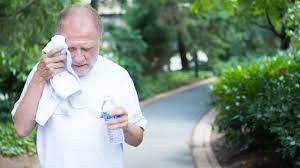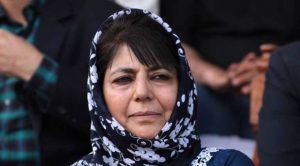
Surviving Summer: Essential Tips for Senior Citizens
By: Professor Upendra Kaul
The Summer is with us, the day temperatures in the valley soar up to 35 degrees Celsius. Mornings and late evenings are however cooler. This year it has been the hottest June in 18 years according to the meteorological department. The Jammu region of our UT, gets the full summer of north India with temperatures close to 42 degrees and sometimes even more. Senior citizens are especially vulnerable to its adverse effects.
The modern houses in the valley are made with winter in mind, with poor ventilation and limited windows. In the traditional Kashmiri houses, The ground floor is meant for winter (Wout) and the top most floor (Kaeni) with a lot of windows and attics ( Dabb) for circulation of air . These are cooler on most days in the mornings, evenings and nights, especially the river front houses.
Hot weather has its own problems besides being uncomfortable for subjects with heart disease and high blood pressure, the elderly population is especially prone for these medical problems.
The patients with previous heart attacks and weak hearts (patients with low left ventricular ejection fraction, LVEF). In order to keep the body cool to produce sweat, it needs to pump harder.
This can be an additional strain producing breathlessness, extreme fatigue and at times transient loss of consciousness. This is especially true for elderly population.
All the medicines however need to be taken but a consultation with the treating physician sought to review the treatment especially those drugs which reduce blood pressure.
Staying in cooler parts of the house during the summer especially during the peak temperature is helpful. Increasing the water intake is important, even if one is not feeling thirsty.
Consuming at least 1 to 1.5 litres is important. This could be in the form of nimbupani or fresh fruit juices. Avoid drinking too much tea, coffee and caffeinated drinks.
These cause loss of fluid from the body. Eating cold foods, fruits with high water content like melon, citrus fruits, and salads should be preferred. Highly spiced food also is not desirable in summer, it leads to excessive need of water to quench the thirst. One of the guides is the colour of the urine. If the urine appears concentrated and yellowish it is a sign of dehydration.
Clothes which one wears are also important. Wear light and loosely fitting clothes of lighter colours. Darker colours, especially black absorbs more heat and transmit it to the body. For this reason, those who are used to wearing Pheran , especially the village dwellers, should use summer pherans, which are lighter. Avoid walking in heat, walk in shade and avoid extreme physical exertion. Carry a bottle of water along with you to quench the thirst.
Tips for senior citizens with medical problems:
- Patients with angina (chest discomfort on exertion) can worsen during summer because of increased demand of oxygen by the heart. In such situations the drug treatment may need modification. They are also advised to restrict their activities on very hot days.
- Patients with high blood pressure often need dose adjustment of their drugs because of water loss due to sweating, the pressures have a tendency of coming down. The water pill called diuretics (like torsemide, chlorothiazide) etc may need to be stopped. Other medicines also sometimes need tweaking in dose. Please remember BP in subjects on pills should be 130/80 mm Hg, pressures below 120/80 have no additional benefits and sometimes may be harmful also. A physician however should be consulted
- Patients with weak hearts (Low LVEF) and heart failure need to revisit their doctor to get the advice regarding the amount of fluid intake allowed. The doses of the water pills (diuretics) often need to be curtailed. One of the signs of excessive dosage is exhaustion, weakness and lightheadedness and BP below 100 mmHg.
- Patients with valve replacement surgeries taking oral anticoagulants (Warfarin or Acitrom) also need their blood tested for prothrombin time, INR. With dehydration and changes in food it may become out of range, The range of acceptable INR for these patients is 2 to 3 and doses may need modification.
- The most vulnerable to get affected by excessive heat are children and elderly population who need proper counselling. The most common symptoms of heat exhaustion are: Headache, moist skin, dizziness and light-headedness, weakness, nausea and vomiting and dark urine.
TAILPIECE
- The heat of the summer months needs to be handled properly especially by elderly subjects with heart disease, high BP, heart failure.
- Proper hydration by adequate fluid intake, wearing light coloured and loose garments, eating less spicy food with plenty of fruits, salads and vegetables.
- Patients with high BP, heart failure and other heart disease should seek counselling from their treating doctors.

